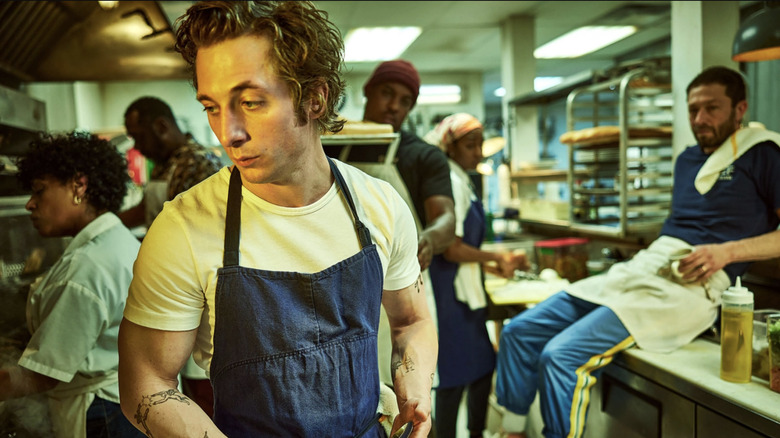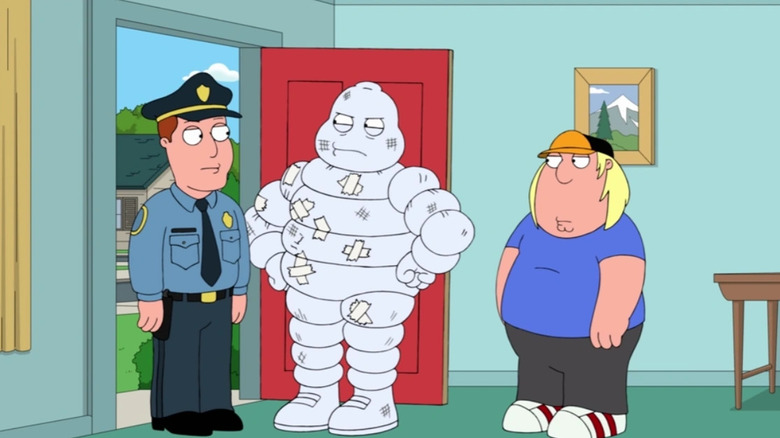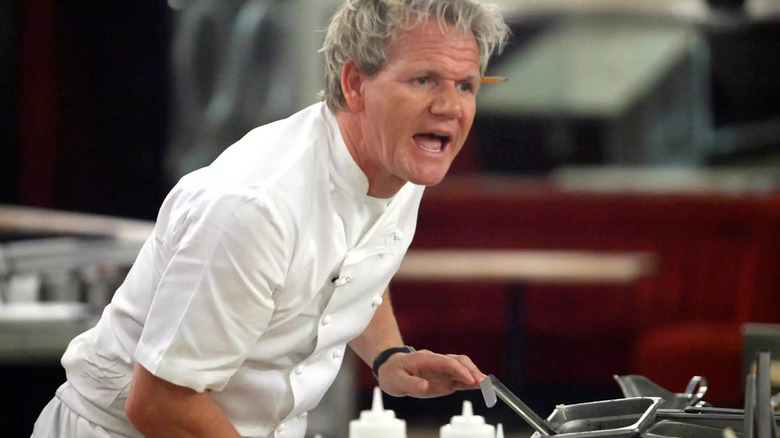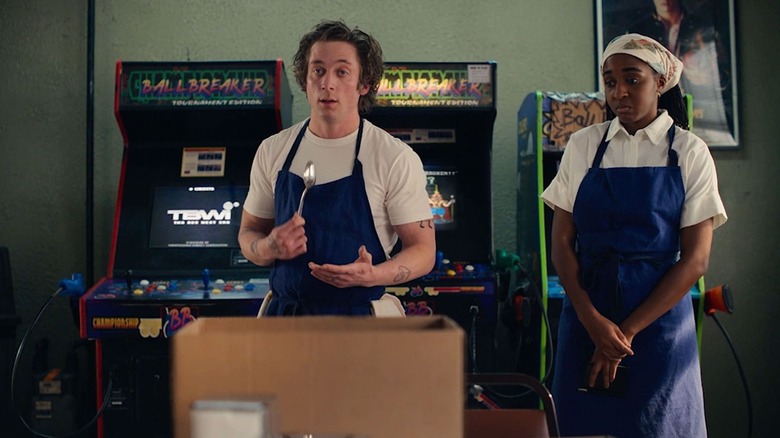The Bear Season 2 Has You Wondering How Michelin Stars Work, Huh?
FX and Hulu's smash-hit drama "The Bear" was far and away the breakout television hit of 2022. Culinary maestro Carmy Berzatto (Jeremy Allen White) returns home to run his deceased brother's Chicago sandwich joint in the wake of his passing, but his high-class cuisine approach immediately clashes with the old-school approach taken by the staff of The Original Beef of Chicagoland. Fortunately, Carmy finds an ally in the form of sous chef Sydney Adamu (Ayo Edebiri), and slowly but surely, the staff unites with Carmy's vision for a better, finer restaurant. The season ended with the discovery of money stashed away in tomato sauce cans for safekeeping by Carmy's brother, enough money to potentially transform The Original Beef into the establishment of Carmy and Sydney's dreams; The Bear.
Sydney, in particular, has always had big culinary dreams, and the passionate, ambitious chef is always trying to come up with interesting new ways to elevate beloved dishes, like her now-famous Cola-Braised Short Rib and Risotto. The sous chef's dreams extend to the new restaurant, and in season 2, she expresses her hopes that one day the place will earn a Michelin Star.
Okay, so, the Michelin Star has been referenced time and again as a sign of quality and excellence, but "The Bear" doesn't stop to fully explain what goes into earning the coveted Star. Honestly, as the show is about dining professionals, it would have been weird to have that conversation without it feeling like an exposition dump. But that's what I'm here for. Here's a rundown on what it takes to earn a Michelin Star and my personal feelings on whether or not The Bear (the fictional restaurant) has a shot at a Star.
The weird history of the Michelin Star
If you hear the word "Michelin" and think to yourself, "Wait, isn't that the tire company with the marshmallow man-looking mascot?" you'd be right. The very same folks behind the recognizable tire company are also responsible for awarding the Star ratings as part of the Michelin Guide. In fact, the guide has been around for over 100 years, first introduced in France by brothers Édouard and André Michelin. Back in the 1900s, cars were still a luxury item, which meant tires were a niche commodity. There were only an estimated 3,000 cars on the roads in France, and most drivers only used their vehicles when absolutely necessary.
This meant that there weren't a lot of tires needing to be replaced, so rather than try to sell unneeded tires, Michelin came up with a motorist's travel guide featuring the locations of petrol stations, hotels, mechanics, and instructions on how to change a tire in case of a flat to motivate people to drive. In the 1926 edition of their motorist's guide, they included the addition of must-try, high-end restaurants. The prestigious honor turned restaurants into tourist destinations, and incentivized eateries to perfect their craft in the hopes that they'd be deemed good enough to be featured in the Michelin Guide. In the years since, the Michelin Star has become shorthand to mean "this restaurant is about to blow your taste buds' mind." Well, if taste buds could have a mind, obviously.
What exactly is a Michelin Star?
If you've spent any amount of time watching competitive cooking shows on the Food Network, chances are you've heard the expression "Michelin Star restaurant" thrown around. The elusive Michelin Star is considered the ultimate hallmark of culinary excellence and is extremely difficult to obtain. According to the official Michelin website:
"A Michelin Star is awarded to restaurants offering outstanding cooking. We take into account five universal criteria: the quality of the ingredients, the harmony of flavors, the mastery of techniques, the personality of the chef as expressed through their cuisine, and, just as importantly, consistency both across the entire menu and over time."
Michelin Stars are awarded to restaurants that Michelin considers to be the very best in a given location, and eateries can be awarded one, two, or three stars. The difference between the three ratings is as follows:
One Michelin Star is awarded to restaurants using top-quality ingredients, where dishes with distinct flavors are prepared to a consistently high standard. Two Stars are awarded when the personality and talent of the chef are evident in their expertly crafted dishes; their food is refined and inspired. And three Stars is the highest award, given for the superlative cooking of chefs at the peak of their profession; their cooking is elevated to an art form and some of their dishes are destined to become classics.
The highly desired rating is determined by full-time Michelin Inspectors, an anonymous group of former restaurant and hospitality professionals. The anonymity ensures that the restaurant in contention is unaware that they're being rated, an assurance that any and every guest receives the same high-caliber treatment. Inspectors visit a location over the course of the year as a means of determining consistency. As a high-profile example, Gordon Ramsay has earned 17 Michelin Stars, and currently holds seven.
Could The Bear actually earn a Star?
Considering the exclusive nature of the Michelin Star, there's a misconception that only hoity-toity, formal restaurants are eligible for the award. Michelin themselves even states on their website, "It's probably a hangover from 30-40 years ago when, in most European cities, the best cooking was often found in formal restaurants." However, any restaurant of any style and cuisine type can qualify for a Star, so while it seems silly that a Chicago sandwich shop is hoping to earn a Star, it's not out of the realm of possibility for the characters on "The Bear" to pull it off.
As of 2022, Chicago, Illinois boasted 23 Michelin Star-awarded restaurants, out of over 21,000 eateries in the Windy City. Additionally, Chicago restaurants Sepia and Boka are two of the most affordable Michelin Starred restaurants in the world, so it's certainly possible for The Bear restaurant to do the same. The Michelin Guide even has a specialized classification called The Bib Gourmand, which is an award for locations boasting "great value, and highlights simple yet skillful cooking at an affordable price." Considering Carmy's background in fine dining and Sydney's passion for accessible cuisine, The Bear would definitely qualify for the Bib Gourmand distinction. If they pull it off, they'd also be achieving an honor that not even America's favorite hungry hero himbo, Guy Fieri, has earned.
Season 2 of "The Bear" is currently streaming on Hulu.



